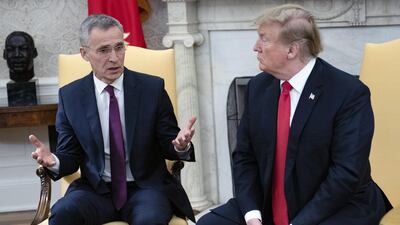US President Donald Trump received the Secretary General of Nato, Jens Stoltenberg, on Tuesday before a ministerial meeting in Washington to address the Russian threat, the bloc's role in Afghanistan and other issues.
Mr Trump, who has criticised Nato and called it obsolete during his presidential campaign, is now taking credit for the state of the alliance on its 70th anniversary.
“Tremendous progress has been made,” Mr Trump said as he welcomed Mr Stoltenberg to the White House.
The US president also welcomed the 2 per cent increase in defence spending among Nato members as part of his agenda to share the burden.
“It may have to go up,” Mr Trump said.
Mr Stoltenberg welcomed Washington’s "strong commitment" and commended Mr Trump’s “strong leadership on burden sharing.”
In a gesture that would underscore the importance of the alliance, Mr Stoltenberg is expected to address a joint session of Congress on Wednesday, a first since the Nato was founded in 1949.
A senior US official said that the Nato gathering on Wednesday, which would include all its members at the ministerial level, would tackle challenges in the Middle East.
Those would include planning in Iraq and Syria after the defeat of ISIS, “as well as Nato’s new training mission in Iraq and the broader efforts the alliance is making to work with our partners in the south to fight the scourge of terrorism together”.
The official also mentioned war in Afghanistan as one of the agenda items.
But the Russian threat is to dominate the meeting.
The official called it a “threat to the alliance and to the United States that includes the actions in the Kerch Strait, the so-called annexation of Crimea, the occupation of Georgia, the Skripal attacks and the violation of the INF agreement".
The US stand-off with Turkey over its purchase of the S-400 Russian missile defence system is raising questions about the unity of the alliance.
On Monday, the US Defence Department froze deliveries of F-35 fighter jets equipment to Turkey until it reversed its sale with Russia.
“It has been made clear to Turkey by the United States at the highest levels on many, many occasions that we have very serious concerns about its stated plans to proceed with the acquisition of the S-400 missile defence system,” the US official said.
He threatened “consequences within sanctions law and the F-35 program if they continue".
Turkish Foreign Minister Mevlut Cavusoglu is on his way to Washington and will hold talks with the administration.
The US is not backing down on its request, especially as tension heightens with Russia over Venezuela and other issues.
“We have made very clear to Turkey that its acquisition of the S-400 will result in a reassessment of Turkey’s participation the F-35 programme and risk other potential future arms transfers, as well as potentially triggering sanctions by the United States,” the administration said.
"Turkey has been and remains an important Nato ally, an important partner to the United States [but] the S-400 is a deeply problematic issue.”
But US defence chief Patrick Shanahan voiced some optimism that there could be a breakthrough with Turkey.
“I expect we’ll solve the problem so that they have the right defence equipment in terms of Patriots and F-35s,” he told Reuters at the Pentagon on Tuesday.
The US hopes to substitute the S-400 sale with Patriot missiles before the Russian system is delivered in July.
If not, Turkey could face sanctions from the US Congress, be removed from the F-35 global consortium and lose access to more than 100 F-35 aircraft to be delivered from Lockheed Martin.

